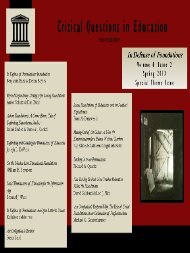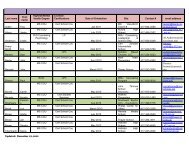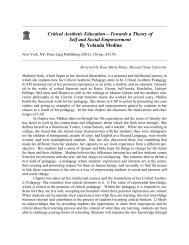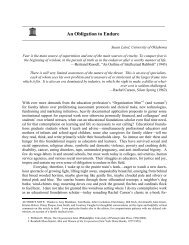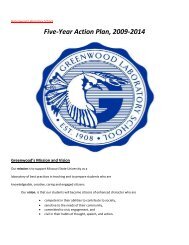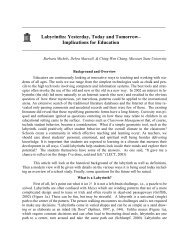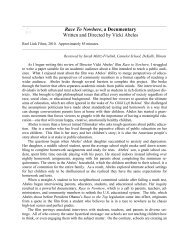Secondary Education - College of Education - Missouri State ...
Secondary Education - College of Education - Missouri State ...
Secondary Education - College of Education - Missouri State ...
You also want an ePaper? Increase the reach of your titles
YUMPU automatically turns print PDFs into web optimized ePapers that Google loves.
Who We Are<br />
The PEU at <strong>Missouri</strong> <strong>State</strong> University is a community comprised <strong>of</strong> candidates, graduates, faculty,<br />
staff, and administrators from a variety <strong>of</strong> departments and colleges across the university, as well as<br />
our school and community partners in the quad-state region. Pr<strong>of</strong>essional education candidates and<br />
graduates are enrolled in or have graduated from initial (undergraduate) or advanced (graduate)<br />
pr<strong>of</strong>essional education programs in teacher education, communication sciences, counseling, or<br />
educational administration and leadership. Pr<strong>of</strong>essional education faculty and staff, from all colleges in<br />
the university, are those who teach courses taken by candidates in pr<strong>of</strong>essional education programs and<br />
provide advising, mentoring, and supervision <strong>of</strong> clinical and field experiences. Our partners include<br />
those in schools and community agencies in which our candidates observe and practice their<br />
developing skills under pr<strong>of</strong>essional supervision and mentoring, from admission through their first<br />
three years <strong>of</strong> pr<strong>of</strong>essional practice. With the contributions <strong>of</strong> faculty who teach liberal arts and general<br />
education courses, we are convinced that at <strong>Missouri</strong> <strong>State</strong>, education is everyone’s business.<br />
The Reflective Inquiring <strong>Education</strong>al Practitioner<br />
We believe that pr<strong>of</strong>essional educators are ―reflective decision makers‖ and inquirers who maintain<br />
that all students can learn. In general, reflective decision-making and inquiry involves:<br />
1. investigating and determining clear and fruitful ways <strong>of</strong> characterizing problems and<br />
opportunities;<br />
2. developing careful, well-informed consideration <strong>of</strong> possibilities or alternatives for action;<br />
3. evaluating the consequences <strong>of</strong> action and potential action through the consideration <strong>of</strong><br />
fairness, equity, and justice (Dewey, 1922, 1933; Elliott, 1991; Freire, 2000; Gardner, 1996;<br />
Schön¸1984).<br />
We believe that reflective practitioners intentionally realize the effect <strong>of</strong> pr<strong>of</strong>essional<br />
education contexts in order to:<br />
1. make informed, rational, fair choices in a variety <strong>of</strong> learning contexts and assume<br />
responsibility for those choices;<br />
2. pursue learning as practitioners, researchers, mentors, coaches, and co-creators with students<br />
and provide meaningful learning experiences in an inclusive environment where all can<br />
learn;<br />
3. examine critically experienced-based perceptions, strategies, and conventional wisdom about<br />
schooling and learning;<br />
4. work in daily pr<strong>of</strong>essional practice to integrate educational theories, academic scholarship,<br />
experiential knowledge, and best instructional practice;<br />
5. recognize teaching as a dynamic process <strong>of</strong> inquiry, renewal, and re-examination in light <strong>of</strong><br />
the refinement <strong>of</strong> established models and the emergence <strong>of</strong> new ones.<br />
Our Beliefs about Pr<strong>of</strong>essional <strong>Education</strong> Knowledge, Skills and Dispositions<br />
We believe that pr<strong>of</strong>essional educators must acquire the knowledge needed to make fully informed<br />
decisions (Brophy & Good, 1986; National Commission on Teaching, 2003; Shulman, 1986, 1987;<br />
vii



